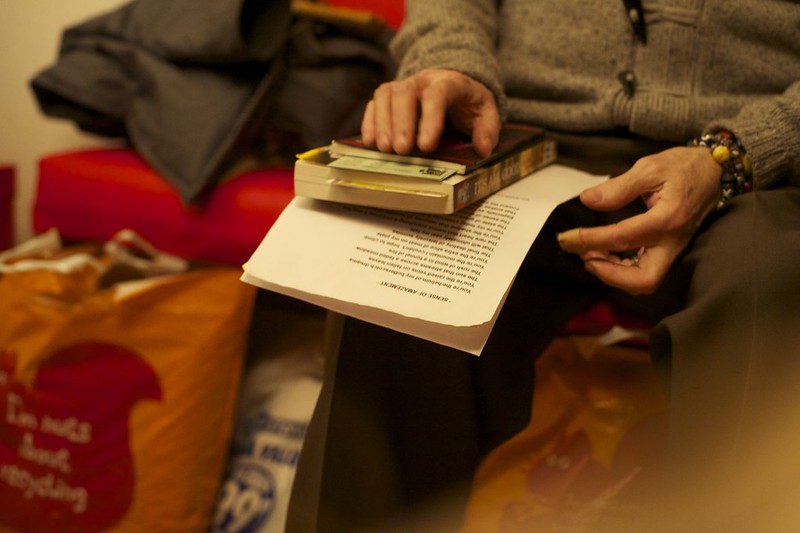There’s something about a sparsely filled, dimly lit room of forced rhyme schemes and aggressive snapping that makes us squirm in our seats. Spoken word poets, thanks to their form and style, are often themselves an exercise in hyperbole.
I feel like they bear an uncanny resemblance to misogynists’ caricature of the off-off-off Broadway performance art feminists who grow out their armpit hair and recite the Vagina Monologues in their sleep.
I recently sent my friend a video clip of Rupi Kaur reading poetry from a book she wrote. Kaur says, “I’m not the whiskey you want…” when a woman in the audience interrupts her loudly to complete her verse, “I’m the water you need!”.
Kaur grins at the gesture.
My friend and I, have been avid critiques of the slam poetry scene since middle school. We regularly send each other such videos that we often love to cringe at. I also do recall a different time. I myself have spent many a night as a 14-year-old watching poem after poem being recited on Button Poetry’s official YouTube channel. I remember being especially touched by ‘When I Say That We Are All Teen Girls,’ by Olivia Gatwood in which she constructs a listicle of all the things, people and entities which reflect the characteristics of young girls that they are often mocked and belittled for.
Still, there was and continues to be an alarming number of self-proclaimed writers who use poetic and performative conventions that are rewarded in slam contexts, only to end up sounding pretentious. The most unnecessary of these conventions is ‘Slam Voice’. Typically Slam Voice sounds like a loud, emotionally charged recitation of unnatural rhythms, intercepted by big breaths and stressing or skimming over syllables – either by warping vowels or creating diphthongs to place emphasis and capture attention. Paired sometimes with animated hand gestures, these performances tend to be jarring. I feel they display a lack of self-awareness that can incite discomfort in viewers.
Of course, it would be incorrect to call all spoken word pretentious. There are many overlaps between theatre, oral storytelling, rap, and spoken word, and many who have performed within those intersections have managed to create wonderful work.
Rap music is one of the best examples of poetry come to life in the spoken word. While all music with lyrics can be seen as a poem, rap is far more comparable to poetry in that it is more focused on rhythm and rhyme than it is with melody, making a strong case for the spoken dimension of the poetic form. The possibilities of experimenting with this dimension are endless.
But newer spoken word artists rarely ever fiddle with mainstream conventions and tend to reuse old style and content.
With regards to content, there are a handful of insightful and well-crafted performance poems I’ve watched that have tackled important or interesting topics in creative ways. Though this kind of poetry is not restricted to political themes, the form is known for its politically charged work and many poets have taken to the medium to discuss socio-political issues and concerns that aren’t typically offered ‘the mic’ in mainstream art spaces or media. Even considering the context in which slam poetry is often performed, “open mics”, if hosted correctly, can democratise creative spaces and widen the realm of who gets to speak into the mic and about what. Such spaces, I suppose, are always at risk of displaying, for the lack of a better word, ‘bad art’ the way slam poetry events and forums are unfortunately notorious for.
This ‘bad art,’ specifically with respect to spoken word, often sounds like an impassioned ramble lacking artistry and on occasion even a decent theme, topic or sentiment. The best of these bad poems convey some kind of message that manages to comes through (though very poorly) and the worst have loosely connected or unconnected clauses and sentences that don’t actually produce any meaning. I have personally heard many of the latter in videos by writers who do readings of a few poems from their independently published poetry books as an attempt to promote or advertise their book. Some of these videos are backed with unrelated, supposedly ‘aesthetic’ visuals and stock, royalty free music to create an emotional appeal. A fair share of parodies and ‘reactions’ are also around the internet to mock this style of writing and video creation.
Despite my clear aversion to the popular praxis of spoken word, I do actually think it is an interesting exercise to see what poetry – or any written word for that matter – looks and sounds like off the page. I find oral storytelling to be incredibly fascinating and actually more impactful, especially for children, than simply reading stories by oneself. Experimenting with voice by tone, pitch, intonation, or accent can produce artful creations that may even surpass the original text by miles.
As an art form rooted in community and to be performed before an audience, spoken word has the undeniable potential to gain reach and draw people into the much larger world of poetry, but at the moment it seems to be driving people far, far away.
Zara Flavia Dmello writes articles on media, culture entertainment and politics.
Featured image: Flickr/monst67 (CC BY 2.0 DEED)

